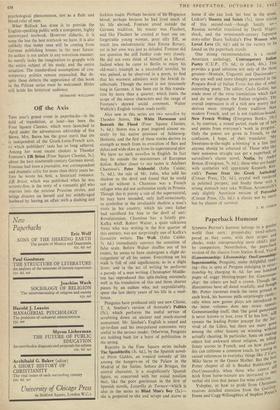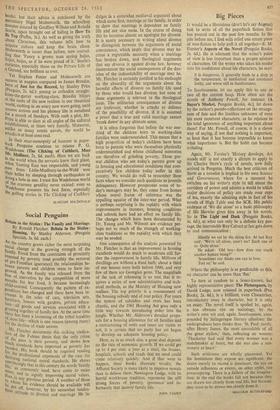Paperback Humour
STEPHEN PorrER's humour belongs to a gentler world than ours : present-day trend-setters, pseud as they come, with their stripes and checks, make oneupmanship seem child's play by comparison. Nevertheless, the paperhac,', version of the classics from Station Road, Yen" (Gamesmanship: Lifemanship: OneUpmanshiP' Supermanship, Penguin), make delightful read- ing—this in spite of Penguin indulging in extor-' tionship by charging 4s. 6d. for one hundred pages of soggy blotting-paper for Gamest-flaw ship: the others are half a crown. Though th,_e illustrations have all dated woefully, and thong" Mr. Potter traverses much the same ground in each book, his humour palls surprisingly rarely: only when new games ploys are introduced in the latter volumes does any strain Weer' Gamesmanship itself, that 'the good gamesmao., is never known to lose, even if he has lost,' will remain the leading Potter precept for the Sur" vival of the Lifest, but there are many getn9, among the other lessons on winning withnn` actually cheating. In particular, hints on making others feel awkward about religion, on telling funny stories in French, and on how journal- ists can cultivate a common touch, by tossing in casual references to everyday things like
Z Car
Mike Same or the Queen Mother. But the beS; Potter chapter of all is Beaded Bubbleshin till OneUpmanship, when those who cannot
hock from horse-manure are instructed in that verbal old iron that passes for wine criticism.
Yuleplay, or how to profit from Christmas, receives detailed attention from the Gattlitic Fenns and Cogg-Willoughbys of Stephen Potter
s
books: but their advice is outclassed by the IPereenary Nigel Molesworth, the schoolboy Monster created by Geoffrey Willans and Ronald Searle, again brought out of hiding in How To Be NJ (Puffin, 3s.). As well as giving the truth about Christmas, this volume tells how to acquire culture and keep the brain clean. M. olesworth is tamer than before, now marvel- ling that `Fancy a grown man saying hums, hums, hujus, as if he were proud of it.' Searle's Cartoons, especially those on the Private Life of a Gerund, are brilliant as ever.
Yet Stephen Potter and Molesworth are squares in nappies compared to James Breedin, hero of Just for the Record, by Stanley Price (Penguin, 2s. 6d.): posing as orthodox straight- from-the-gutter working-class, Breedin blitzes at .the roots of the new realism in our theatrical world, cashing in on every new wave going, until success arrives and his phoney life is serialised rot a month of Sundays. With such a plot, Mr. Price is able to slam at all angles of the cultural establishment, at times very funnily. Moreover, unlike so many comic novels, the world he attacks is at least semi-real.
In their near-monopoly of humour in paper- back Penguins continue to reissue P. G. Wodehouse (The Clicking of Cuthbert, Meet 14E. Mulliner, 2s. 6d. each). Here we are back in the world when the servants knew their place, when Tooting East was respectable, and young men from Little-Mudbury-in-the-Wald won their belles by sleeping through earthquakes or doing a hole in one. I trust this Wodehouse world of the crummy gentility never existed: even so Wodehouse presents his best form, especially the golfing stories in The Clicking of Cuthbert.
ALASTAIR MACDONALD















































 Previous page
Previous page